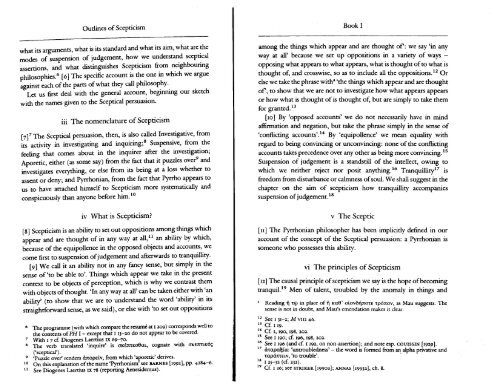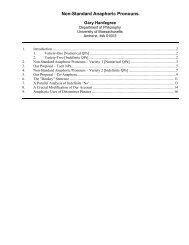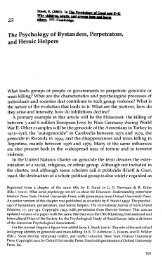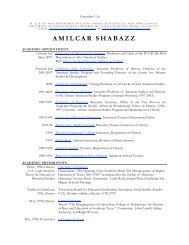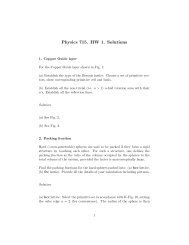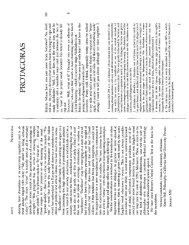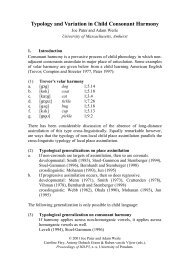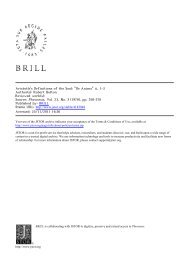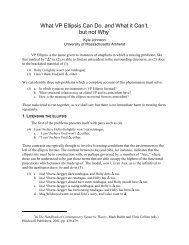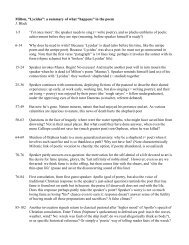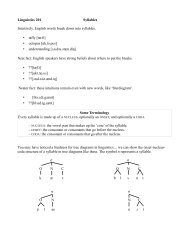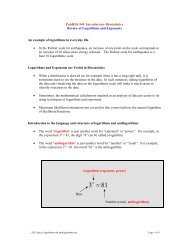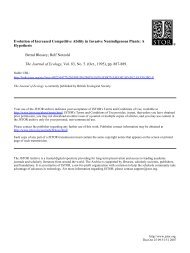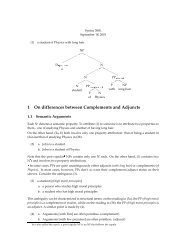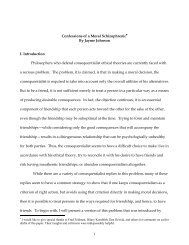HISTORY OF PHILOSOPHY Outlines of Scepticism
HISTORY OF PHILOSOPHY Outlines of Scepticism
HISTORY OF PHILOSOPHY Outlines of Scepticism
Create successful ePaper yourself
Turn your PDF publications into a flip-book with our unique Google optimized e-Paper software.
<strong>Outlines</strong> <strong>of</strong> <strong>Scepticism</strong><br />
what its arguments what is its standard and what its aim, what are the<br />
modes <strong>of</strong> suspenSiOn <strong>of</strong> judgement, how we understand sceptical<br />
assertions, and what distinguishes <strong>Scepticism</strong> from neighbouring<br />
philosophies.<br />
against each <strong>of</strong> the parts <strong>of</strong> what they call philosophy.<br />
Let us first deal with the general account, beginning our sketch<br />
with the names given to the Sceptical persuasion.<br />
6 [6] The specific account is the one in which we argue<br />
iii The nomenclature <strong>of</strong> <strong>Scepticism</strong><br />
[7]7 The Sceptical persuasion, then, is also called Investigative, from<br />
8 Suspensive, from the<br />
its activity in investigating and inquiring;<br />
feeling that comes about in the inquirer after the investigation;<br />
Aporetic, either (as some say) from the fact that it puzzles over<br />
investigates everything, or else from its being at a loss whether to<br />
assent or deny; and Pyrrhonian, from the fact that Pyrrho appears to<br />
us to have attached himself to <strong>Scepticism</strong> more systematically and<br />
conspicuously than anyone before him.’°<br />
iv What is <strong>Scepticism</strong>?<br />
9 and<br />
[8] <strong>Scepticism</strong> is an ability to set out oppositions among things which<br />
appear and are thought <strong>of</strong> in any way at all,” an ability by which,<br />
because <strong>of</strong> the equipollence in the opposed objects and accounts, we<br />
come first to suspension <strong>of</strong> judgement and afterwards to tranquillity.<br />
[9] We call it an ability not in any fancy sense, but simply in the<br />
sense <strong>of</strong> ‘to be able to’. Things which appear we take in the present<br />
context to be objects <strong>of</strong> perception, which is why we contrast them<br />
with objects <strong>of</strong> thought. ‘In any way at all’ can be taken either with ‘an<br />
ability’ (to show that we are to understand the word ‘ability’ in its<br />
straightforward sense, as we said), or else with ‘to set out oppositions<br />
6 The programme (with which compare the resumé at t 209) corresponds well to<br />
the contents <strong>of</strong>PHI — except that x 13—20 do not appear to be covered.<br />
With i 7 cf. Diogenes Laertius ix 69—70.<br />
8 The verb translated ‘inquire’ is mthtteoOat, cognate with oxextucOç<br />
(‘sceptical’).<br />
‘Puzzle over’ renders ãitopth, from which ‘aporetic’ derives.<br />
10 On this explanation <strong>of</strong> the name ‘Pyrrhonism’ see BARNES [1992], pp. 4284—6.<br />
“ See Diogenes Laertius IX 78 (reporting Aenesidemus).<br />
Book I<br />
among the things which appear and are thought <strong>of</strong>’: we say ‘in any<br />
way at all’ because we set up oppositions in a variety <strong>of</strong> ways —<br />
opposing what appears to what appears, what is thought <strong>of</strong> to what is<br />
thought <strong>of</strong>, and crosswise, so as to include all the oppositions.’<br />
else we take the phrase witha ‘the things which appear and are thought<br />
<strong>of</strong>’, to show that we are not to investigate how what appears appears<br />
or how what is thought <strong>of</strong> is thought <strong>of</strong>, but are simply to take them<br />
for granted.’<br />
[ioj By ‘opposed accounts’ we do not necessarily have in mind<br />
affirmation and negation, but take the phrase simply in the sense <strong>of</strong><br />
‘conflicting accounts’.’<br />
regard to being convincing or unconvincing: none <strong>of</strong> the conflicting<br />
accounts takes precedence over any other as being more convincing.’<br />
Suspension <strong>of</strong> judgement is a standstill <strong>of</strong> the intellect, owing to<br />
which we neither reject nor posit anything.’<br />
freedom from disturbance or calmness <strong>of</strong>soul. We shall suggest in the<br />
chapter on the aim <strong>of</strong> scepticism how tranquillity accompanies<br />
suspension <strong>of</strong> judgement.’<br />
3<br />
2 Or<br />
4 By ‘equipollence’ we mean equality with<br />
8<br />
v The Sceptic<br />
5<br />
7 is<br />
6 Tranquillity’<br />
[uj The Pyrrhonian philosopher has been implicitly defined in our<br />
account <strong>of</strong> the concept <strong>of</strong> the Sceptical persuasion: a Pyrrhonian is<br />
someone who possesses this ability.<br />
vi The principles <strong>of</strong> <strong>Scepticism</strong><br />
[xa] The causal principle <strong>of</strong> scepticism we say is the hope <strong>of</strong> becoming<br />
tranquil)<br />
9 Men <strong>of</strong> talent, troubled by the anomaly in things and<br />
Reading in place <strong>of</strong> KaO’ otovôqxotE tpóxov, as Mau suggests. The<br />
sense is not in doubt, and Mau’s emendation makes it clear.<br />
12 See I 31—2; M viii 46.<br />
‘ Cf. 119.<br />
14<br />
Cf. I, 190, 198, 202.<br />
See 1190; cf. 196, 198, 202.<br />
16 See I 196 (and cf. I 192, Ofl non-assertion); and note csp. couissiN [1929].<br />
17 àtapaa: ‘untroubledness’ — the word is formed from an alpha privative and<br />
tapdttrtv, ‘to trouble’.<br />
18<br />
25—32 (cf. 232).<br />
19 Cf. i 26; see STRIKER [199oa]; ANNAS [1993aj, ch. 8.


